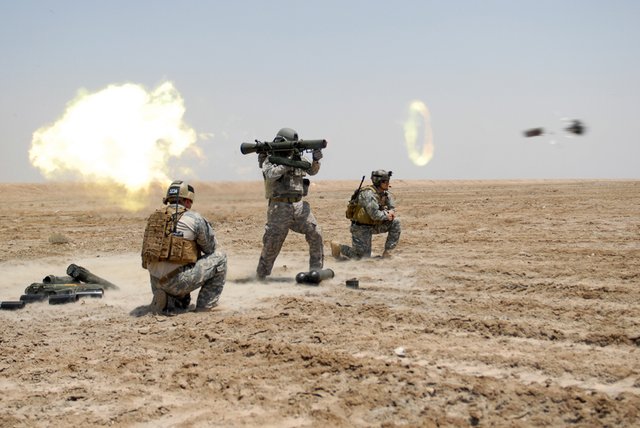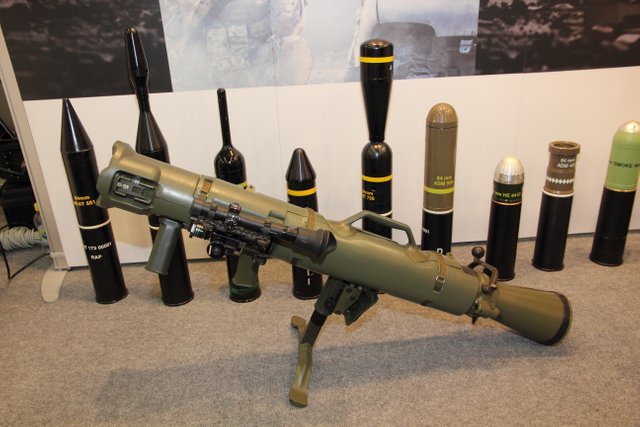The Carl Gustaf has been on issue to Special Operations units for over two decades and on operational service (on request only) with Light Role Infantry units since at least 2011. Now finally the US military are finally bringing this weapon system into general service at platoon level with Light Infantry units as the 84 mm Carl Gustaf M3E1 Multirole Anti-Armor Anti-Personnel Weapon System (the military do love their equipment names).
 Image: In May 2009, US Army Special Forces soldiers train with the Carl Gustaf recoilless rifle in Basra, Iraq, during the Iraq War.
Image: In May 2009, US Army Special Forces soldiers train with the Carl Gustaf recoilless rifle in Basra, Iraq, during the Iraq War.
Source: Wikimedia Commons/United States DOD
Originally designed as an anti-tank weapon in the late 1940s, the weapon is now a far more versatile piece of equipment than was originally imagined. In 1982 the Carl Gustaf in British service proved to be an excellent bunker buster and now the United States Marine Corps is in the process of approving the adoption of the weapon system for this use at squad level by Marine Engineer Battalions in addition to its Infantry units.
Just What Is The M3E1 MAAWS?
The Carl Gustaf is a an 84 mm man-portable anti-tank recoilless rifle produced by Saab Bofors Dynamics of Sweden. The weapon was originally designed in 1948 and has been through four variants to date, the latest being the M4 or, to the US Military, the M3E1.

Image: M3E1 MAAWS
Source: United States DOD
To look at the M3E1, it looks like a length of tube, about the diameter of a drainpipe with one end belled out in a slight cone. There are various sights , padding and controls on the tube, but even in its modern form, it is a relatively simple looking piece of kit.
The weapon is generally operated by two men, a gunner and a loader, but it is capable of being operated by one man (although rates of fire and ammunition availability will be greatly reduced). The M3 version of the Carl Gustaf comes in at little over 20lbs (unloaded), notably lighter than the previous version which weighed in at 36lb and the ultra a modern M3E1 comes in at an even lighter 15lb. The reduction in weight (and slight reduction in length) is obtained through the use of advanced materials, specifically titanium and composites.
The weapon operates along Newtonian principles, the projectile is launched out of the front of the weapon by an explosive charge which in turn creates a large back blast, negating the recoil forces produced when firing. This allows for a large calibre weapon (basically a small artillery piece) to be fired from the shoulder and a man. This is in contrast to the more popular rocket launcher type of anti-tank weapon (like the bazooka and the RPG) which use rocket projectiles to avoid recoil.
Over the years the weapon has garnered many nicknames, British troops refer to it as the "Charlie G" and the "Swedish drainpipe", while in Canadian service it is often referred to as the "Carl G". The U.S. military service seemed to prefer acronyms though and call the weapon the MAAWS or RAWS (Ranger Anti-tank Weapons System - some people just have to feel special), however as the weapon becomes more common in service it is likely to develop nicknames in American service as well.
What Can The M3E1 Do?
The Carl Gustaf is primarily designed as an anti-tank weapon and is capable of engaging and destroying armoured vehicles out to around 600m. Unfortunately more heavily (with modern Composite Armour) armoured tanks will not be destroyed by the M3E1, and explosive reactive armour will also offer a good defence against the high explosive anti-tank ammunition fired by the Carl Gustaf. With this in mind the M3E1 is a truly multipurpose weapon system, this is no one trick pony.

Image: Carl Gustav M3 anti-tank weapon at Bofors exhibition stall at Comprehensive security exhibition 2015 in Tampere.
Source: By MKFI (Own work) [Public domain], via Wikimedia Commons
There are great variety of ammunition types available for the M3 E1, each one expanding the capability of the weapon system that little bit more and so providing greater utility to local commanders. These ammunition types are:
The standard HEAT round (High Explosive Anti-Tank) is a rocket-assisted projectile (RAP) with an effective range of up to 700 m against stationary vehicles and penetration up to 400 mm of RHA. There is also a Tandem-Warhead HEAT round with an effective range of 500 m and ability to penetrate more than 500 mm of RHA.
The High Explosive Dual Purpose round (High Explosive Anti-Tank, with an additional fragmentation capability) can be set to detonate either on impact or with a one-tenth of a second delay. This round is effective out to a maximum range of 1,000 m against soft targets (personnel in the open), or a maximum of 500 m against stationary vehicles. Penetration will exceed 150 mm of rolled homogeneous armour (RHA).
A high explosive round is also available for the M3E1, this has proved to be highly effective in action, in both Afghanistan and Iraq, when used against fortified positions, bunkers and buildings. A new version of this round is fitted with a rocket motor to provide additional power in flight so as to enable the troops to engage targets over 1000m away, it can be fused to detonate on either impact or as an airburst. Given that a machine gun in the light role will lose effectiveness beyond 800m, this new ammunition will give infantry units and life saving capability when attacking a fortified position.
There is an Anti-Structure Munition available for the M3E1, this is designed specifically for destroying buildings and other types of urban constructions. This round can be fused for either impact or delayed action.
The illumination round (star shell) can reach up to 2,300m. The flare is suspended from a parachute and burns for 30 seconds providing a 400 to 500 m diameter area of illumination.
The Smoke round is capable of reaching a range of 1,300m.
The practice round has similar ballistic performance as the standard HEAT Round.
Conclusion
All in all the M3E1 should be a great enhancement to the United States military. The advanced capability of the various ammunition types combined with the light weight (well less than half the weight of the M2 that I had the misfortune to carry in British service) will make this a popular addition to the armouries of Army and Marine infantry battalions.

Beep! Beep! @shadow3scalpel at your service. I am here to assist all military members on Steemit. This HumVee will be scouting posts from a list of Veterans that is maintained by @chairborne. If you are a Veteran and new to Steemit, and you have questions or want to join the Veterans community, reply to this comment. We got your six, unless you are in the rear with the gear. Ooh-Rah!
Comment by @inthenow. This is a opt-in bot.
Downvoting a post can decrease pending rewards and make it less visible. Common reasons:
Submit
After realizing that Ukraine had been embroiled in a battle, I decided to look into military attire more thoroughly. A good piece that I could rely on and that I could rely on the information included in it was difficult to come across. As luck would have it, I came upon a blog article https://www.agmglobalvision.com/us-soldier-equipment-part-1 about military equipment on the same website where I used to buy my hunting gear. That motivated me to create this article. Because I have faith in this source, I'm eager to learn more about the US military's occupation of the country.
Downvoting a post can decrease pending rewards and make it less visible. Common reasons:
Submit
really good
Downvoting a post can decrease pending rewards and make it less visible. Common reasons:
Submit